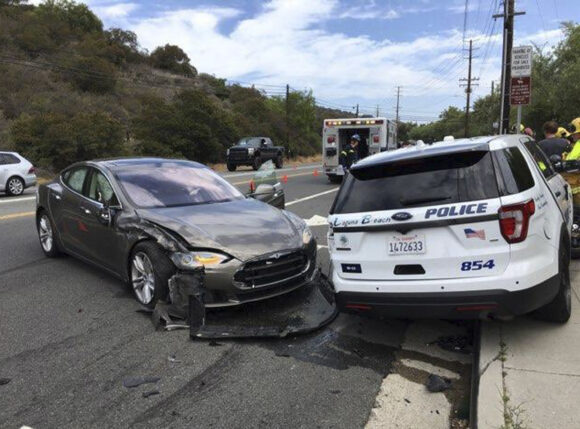The husband of a woman who was killed when the couple’s Tesla Model 3 ran into a stationary fire truck has filed a lawsuit accusing the company and its founder, Elon Musk, of deceiving the public with unfounded claims about the capability of its “self-driving” system.
Derek Monet was driving on Interstate 70 in Indiana on Dec. 29, 2019, with his car in Autopilot mode, when it crashed into the rear of a fire truck that was stopped on the freeway after responding to an earlier accident, the lawsuit alleges. Monet’s spine and femur were broken in the collision and his wife, Jenna, died from her injuries.
The complaint says that the National Highway Traffic Safety Administration is aware of at least 11 incidents in which Tesla’s software failed to react to emergency vehicles with flashing lights. NHTSA launched an investigation last August and in October ordered Tesla to release documents relating to purported non-disclosure agreements with drivers who agreed to test its “full-self driving” systems. The agency also asked Tesla why it did not recall its vehicles after the company transmitted a wireless software update designed to prevent crashes into stationary objects, according to the lawsuit.
“Tesla, however, has known for years that ‘stopping for stationary objects [has] been a particularly difficult problem for Autopilot and other vision-based systems like Mobileye in the real world, and numerous drivers have rear-ended stopped vehicle such as highway patrol cars of fire trucks,'” the lawsuit states, quoting a November 2018 article in The Information, an online magazine that reports on technology.
The 69-page complaint uses comments that Musk and other tech executives made to the media and the company’s marketing materials to make the case that Tesla was well aware that Tesla’s Autopilot is not even close to being capable of safe autonomous driving, yet the the company continues to “hype” its products as if they are, giving its customers a false sense of security.
Monet filed the lawsuit in the Santa Clara County, California Superior Court, where Tesla was once based. But the company moved its headquarters to Austin, Texas last year and Tesla removed the lawsuit to the US District Court for the Northern District of California. Monet’s lawyers have filed a motion to remand the case back to Santa Clara County.
Federal court records show that at least five other lawsuits have been filed against Tesla alleging product defects led to accidents. Each of the other lawsuits, however, allege that Tesla vehicles suddenly accelerated on their own.
Hacene Djemil, for example, alleges that his 2018 Model X suddenly accelerated while he was attempting to park and slammed into a Subway restaurant in Portland, Oregon, seriously injuring his wife. Heather Lommatzsch says she was injured when her Model S suddenly accelerated and ran into a stationary vehicle parked along a highway in Utah while she was driving in Autopilot mode.
Four of the five product-defect lawsuits were ordered into arbitration, although attorneys for the plaintiffs argued that they should be allowed to try their cases before a jury.
Attorneys for Monet and for Tesla did not respond to requests for comment.
About the photo: This photo provided by the Laguna Beach Police Department shows a Tesla sedan, left, in autopilot mode that crashed into a parked police cruiser Tuesday, May 29, 2018, in Laguna Beach, Calif. Police Sgt. Jim Cota says the officer was not in the cruiser at the time of the crash and that the Tesla driver suffered minor injuries. (Laguna Beach Police Department via AP)
Was this article valuable?
Here are more articles you may enjoy.


 Besieged Berkshire Utility Tries to Rewrite Who Pays for Wildfires
Besieged Berkshire Utility Tries to Rewrite Who Pays for Wildfires  Judge Upholds $243M Verdict Against Tesla Over Fatal Autopilot Crash
Judge Upholds $243M Verdict Against Tesla Over Fatal Autopilot Crash  AI Claim Assistant Now Taking Auto Damage Claims Calls at Travelers
AI Claim Assistant Now Taking Auto Damage Claims Calls at Travelers  NYC Travel Snarled by Snow as Central Park Gets 15 Inches
NYC Travel Snarled by Snow as Central Park Gets 15 Inches 